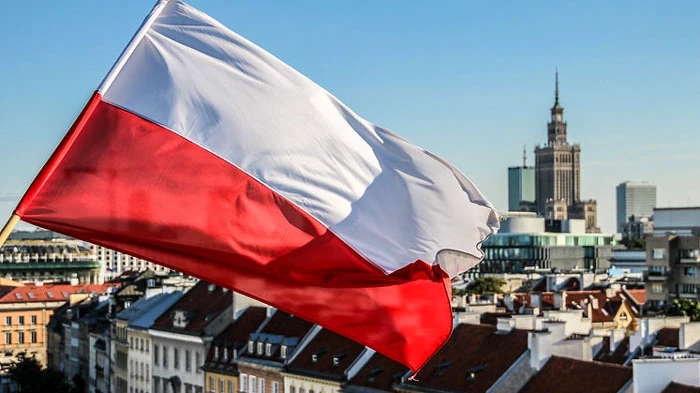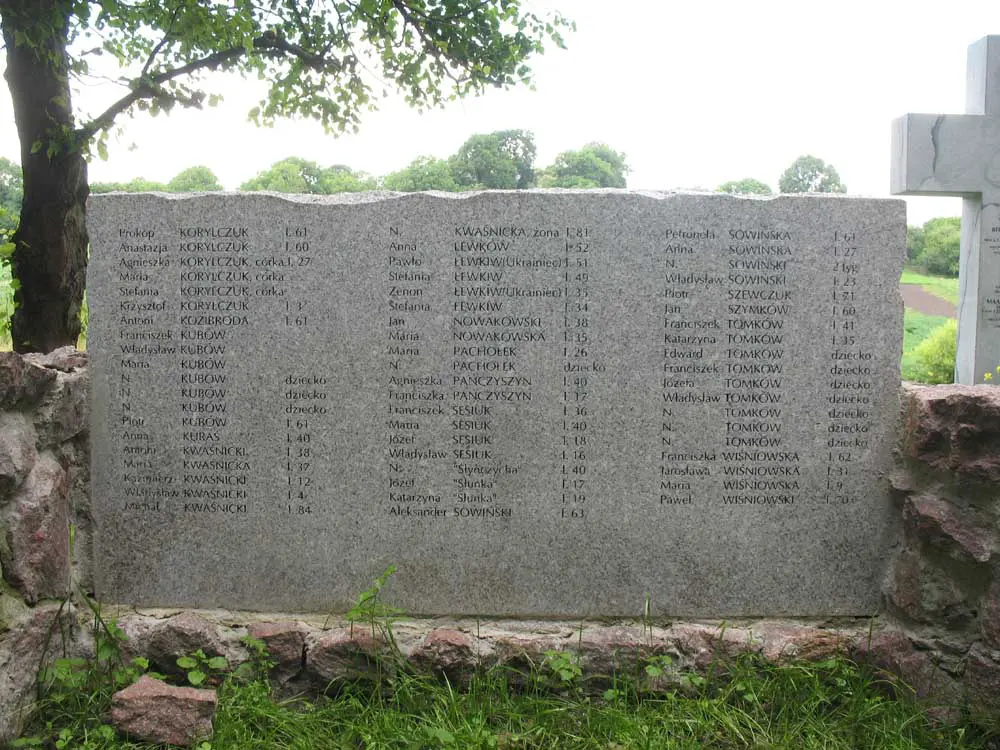He demanded an apology from Zelensky for Volyn. Polish Foreign Ministry spokesman suspended

Polish Foreign Ministry spokesman Lukasz Jasina has been placed on indefinite leave. The reason for his suspension was his comments on the Volyn tragedy and Ukraine.
This information was published on RMF24.
"Lukasz Jasina is officially on leave for an unlimited period. He will no longer hold the position of the ministry's spokesperson," the statement said.
The reason for his suspension was his words in which he demanded that Ukrainian President Volodymyr Zelenskyy apologize and show more remorse for the Volyn tragedy. The Ukrainian embassy called these comments "sad."
What exactly did the Polish Foreign Ministry spokesperson say?
"I believe that on the part of Ukraine, and here I will be as diplomatic as possible, there is still a misunderstanding, because this is a very important issue (the Volyn tragedy - ed.) for the Poles today," Yasina said.
When asked whether President Volodymyr Zelenskyy should apologize for the tragedy, he replied that Ukraine had not done so before, and Zelenskyy should take more "responsibility."
The Volyn Tragedy: A Deep Dive into a Historical Catastrophe
Introduction
The Volyn Tragedy remains an emblematic historical event of the mid-20th century. A cataclysm that struck deep within the heartlands of Volyn, a region that was known for its peaceful coexistence between different ethnicities, it was indeed a tragedy of epic proportions. But what exactly transpired during those tumultuous times? Let's delve into it.
Background of the Volyn Tragedy
During World War II, Volyn, a region now split between Western Ukraine, Eastern Poland, and Belarus, saw mass ethnic cleansing that targeted the Polish population. These events, referred to as the Volyn Tragedy or the Volyn Massacres, were primarily conducted by the Ukrainian Insurgent Army (UPA) and resulted in the deaths of tens of thousands of Poles.
The Main Players
The Ukrainian Insurgent Army (UPA)
The UPA was the military branch of the Organization of Ukrainian Nationalists—Bandera faction (OUN-B), a political group that sought independence for Ukraine.
The Polish population in Volyn
The Polish population in Volyn was a mix of indigenous Poles and settlers who moved in after the Polish-Soviet War. Despite the cohabitation, tensions between Ukrainians and Poles had been building up due to political and territorial disputes.
Nazi Germany
Nazi Germany, while not directly involved in the massacres, had a significant influence on the overall situation as the occupying power in Ukraine and Poland during this time.
Events Leading to the Tragedy
The massacres took place against the backdrop of a brutal war and an equally brutal occupation by Nazi Germany. The circumstances bred desperation, fear, and resentment, further fueling the violence.
The Massacres Begin
The killings started in early 1943, and by the summer, they had spread across the entire region. Men, women, and children were brutally murdered, often with axes and farm tools. Entire villages were razed to the ground.

The Brutality of the Violence
The accounts of violence from this time are chilling. It was not just a matter of death; the brutality with which the killings were carried out is shocking to the conscience.
The Response from Polish forces
Polish self-defense units and later the Home Army retaliated, exacerbating the violence. The cycle of revenge killings only ended with the final military operations in the region in 1945.
World War II and the Volyn Tragedy
The Volyn Tragedy was not an isolated event. It was part of the larger chaos and violence of World War II. The war created an environment where such massacres could occur.
The Aftermath of the Tragedy
The massacres ended with massive population transfers between Poland and Soviet Ukraine after the war. The Polish population in Volyn practically disappeared, either through death or displacement.
Controversies and Interpretations
The Ukrainian Perspective
Many Ukrainians view the Volyn Tragedy as a reaction to Polish oppression and a fight for independence. This perspective, however, has been challenged due to the brutal nature of the violence.
The Polish Perspective
The Poles consider the Volyn Tragedy a genocide perpetrated by the UPA. It's a deeply ingrained trauma and a major factor in Polish-Ukrainian relations.
Remembrance and Reconciliation
Efforts have been made towards reconciliation. However, the wound is still fresh in the collective memory of both nations, making the process challenging.
The Impact on Polish-Ukrainian Relations
The Volyn Tragedy continues to cast a long shadow over Polish-Ukrainian relations. Efforts to come to terms with this past remain a hot-button issue in both countries.
The Lessons of History
The Volyn Tragedy underscores the horrors that can arise from ethnic hatred and the breakdown of societal norms. It's a stark reminder of the need for peace, understanding, and reconciliation.
FAQs
1. What sparked off the Volyn Tragedy?
The Volyn Tragedy was sparked off by deep-seated ethnic and political tensions between the Polish and Ukrainian populations, which escalated dramatically during World War II. The radical nationalist group, the Ukrainian Insurgent Army (UPA), seeking to create an ethnically homogeneous Ukrainian state, started targeting the Polish population in a campaign of ethnic cleansing.
2. How many people died in the Volyn Tragedy?
The exact number of victims in the Volyn Tragedy is a point of contention between scholars and is subject to ongoing debate. Estimates vary widely, but it's generally accepted that tens of thousands of Polish people were killed in the massacres. Some estimates put the number of Polish victims as high as 100,000. Ukrainian casualties due to reprisals by Polish forces are also significant but are usually estimated to be lower.
3. How did the international community react to the Volyn Tragedy?
At the time of the Volyn Tragedy, the world's focus was on the larger conflict of World War II. It wasn't until much later that the international community began to grapple with the events in Volyn. In the years since, there have been efforts by historians, politicians, and various international bodies to acknowledge and understand this tragic period. However, the interpretation of these events often differs significantly between Ukraine and Poland, and reconciling these differing views remains a challenge.
4. What measures have been taken towards reconciliation?
There have been several measures taken towards reconciliation. These include joint commemorations of the events, mutual acknowledgment of the wrongs committed, and apologies by statesmen from both nations. However, the path to reconciliation is complicated by differing interpretations of the events, nationalistic sentiments, and political considerations.
5. What are the major challenges in Polish-Ukrainian reconciliation?
One of the major challenges in Polish-Ukrainian reconciliation is the differing interpretations of historical events, especially concerning the Volyn Tragedy. For many Ukrainians, the actions of the UPA are seen as a fight for independence, while for most Poles, they are viewed as a campaign of ethnic cleansing or even genocide. This differing perception of history makes reconciliation a complex process. Other challenges include nationalistic sentiments, political considerations, and issues concerning the respect for and treatment of minorities in both countries.
To leave a comment, please log in.